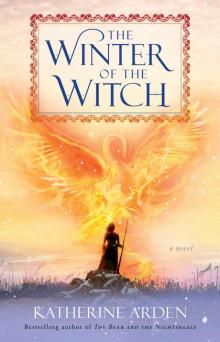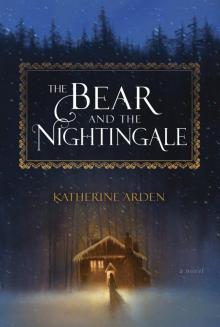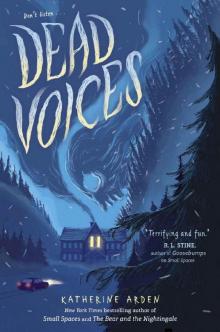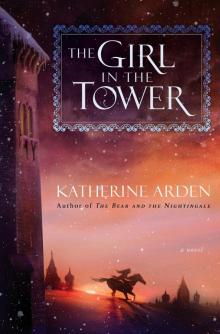- Home
- Katherine Arden
The Winter of the Witch Page 15
The Winter of the Witch Read online
Page 15
Pozhar stamped. I will tell her. She wheeled and galloped away, skimming the snow and melting it, the cut on her leg almost mended already.
“Thank you,” said Vasya to Polunochnitsa.
“You are going to your death, Vasilisa Petrovna,” said Midnight. But there was doubt now in her voice. Her black stallion arched his neck and blew softly; she scratched his withers, frowning.
“Even then,” said Vasya. “Thank you.” She began to make her painstaking way toward the village. She could feel Midnight watching her go. Just before she was out of earshot, Midnight called, as though she could not help it, “Go to the great house. But tell no one who you are.”
Vasya glanced back, nodded, and walked on.
She would have expected Morozko’s prison to look something like the Bear’s clearing. Or perhaps a locked and guarded tower and he confined, like a princess, at the top of it. At least, she would have expected it to be a summer place: one where he was faint, powerless. But this was just a village. In winter. Gardens slept under snow; beasts drowsed in their warm stables. A single house in the very center streamed noise and light. Smoke poured from a hole in the roof. She could smell meat roasting.
How could Morozko be here?
Vasya climbed the palisade and crept toward the great house.
She was quite near when the fresh-fallen snow of its dooryard quivered and a chyert emerged. Vasya halted abruptly. It was the dvorovoi, the dooryard-guardian, and he was not tiny, like all the other dvoroviye she had ever known. He was as tall as she, his eyes fierce.
Vasya bowed, with wary respect.
“Stranger, what are you doing here?” he growled.
Her mouth and throat were dry, but she managed, “Grandfather, I am here for the feasting.” Not quite a lie. She was hungry; Ded Grib’s camp-rations seemed an age ago.
Silence. Then the dvorovoi said, “You have come a long way, only for the feasting.”
“I am also here for the winter-king,” she admitted, low. It was difficult to deceive a house-spirit, and unwise to try.
The dvorovoi’s eyes measured her. She held her breath. “Go through the door then,” he said simply, and vanished once more into the snow.
Could it be so simple? Impossible. But Vasya walked toward the door. Once she had loved feasts. Now all she heard was too much noise, all she smelled was fire. With an odd detachment, she looked down at her hand, realized that it was shaking.
Gathering her courage, she went up the stairs, between bars of lamplight. A dog began to bark. Then another, a third, a whole chorus. Next moment, the door opened, creaking in the cold.
But it was not a man who came out, or, what Vasya had feared, several men, with blades. It was a woman, alone. She was accompanied by a torrent of warm, smoky air, rich with the smell of cooking.
Vasya stood still, her whole being bent on not fleeing into the shadows.
The woman’s hair was the color of good bronze. Her eyes were like amber beads; she was almost as tall as Vasya. The grivna on her throat was gold; gold there was too on her wrists and ears, set on her belt, plaited in her hair.
Vasya knew how she must look to this woman: wild-eyed after the long darkness, lips trembling with cold and terror, clothes crackling with frost. She tried to sound eminently sane when she said, “God be with you,” but her voice was hoarse and faint.
“The domovoi said we had a visitor,” the woman said. “Who are you, stranger?”
The domovoi? Can she hear—? “I am a traveler,” Vasya said. “I came to ask supper and a place for the night.”
“What is a maiden doing, traveling alone at Midwinter? And dressed so?”
So much for her boy’s clothes. Vasya said carefully, “The world is not kind to a maiden alone. Safer to dress as a boy.”
The frown between the woman’s eyes deepened. “You have no sling, no pack, no beast. You are not dressed to spend even one night out of doors. Where have you come from, girl?”
“From the forest,” Vasya improvised. “I fell into the river and lost all I had.”
It was almost the truth. The woman’s brows drew together. “Then why—” She paused. “Can you see?” she asked in a different voice. She looked suddenly half-afraid, half-eager.
Vasya knew what she meant. Tell no one who you are. “No,” she said at once.
The eager light faded from the woman’s eyes. She sighed. “Well, it was too much to hope for. Come, there are lords visiting from all about, and their servants; you will not be noticed. You may eat in the hall, and have a warm place to sleep.”
“Thank you,” said Vasya.
The tawny woman opened the door. “I am Yelena Tomislavna,” she said. “The lord is my brother. Come.”
Vasya, heart beating very fast, followed her in. She could feel the dvorovoi at her back. Watching.
* * *
YELENA CAUGHT THE SHOULDER of a servant. A few words passed between them. All Vasya heard was “get back to our guest” from Yelena. A strange expression of sympathy crossed the face of the old servant.
Then the servant bustled Vasya into a cellar full of chests, bundles, and barrels. Muttering to herself, she began to rummage. “No harm will come to you here, poor maiden,” she said. “Take off those clothes; I will find you something proper.”
Vasya debated arguing, realized that it might get her thrown out. “As you say, babushka,” she said and began to strip. “But I would like to keep my old clothes.”
“Well, of course,” said the old servant kindly. “Never fling away wantonly.” Eyeing Vasya’s bruises, she clucked and said, “Husband or father’s handiwork, I care not. Bold girl, to dress as a boy and run away.” She turned Vasya’s cut face to the light, frowned dubiously. “Perhaps, if you stay here and work hard, the lord will give you a little dowry, and you may find a new husband.”
Vasya wasn’t sure whether to laugh or be vexed. The servant thrust a coarse linen shift over Vasya’s head. Over that went a length of cloth, hanging loose front and back, then belted. Bast shoes for her feet. The servant patted Vasya’s cropped black head and produced a kerchief. “What were you thinking, child, to cut your hair?”
“I was traveling as a boy,” Vasya reminded her. “Safer.” She slipped the wooden nightingale into the sleeve of her shift. The clothes smelled of onion and their previous owner, but they were warm.
“Come into the hall,” the servant said, after a pitying silence. “I will find you some supper.”
* * *
THE SMELL OF THE FEAST hit her first: of sweat and honey-wine and fat meat roasted in a great pit of coals at the center of a long hall. The room was packed with people, richly dressed; their ornaments gleamed copper and gold in the smoke-haze. The heat went up, making the air dance, to a hole in the center of the roof. A single star gleamed in the blackness, swallowed by the rising smoke. Servants bore in baskets of fresh bread, dusted with snow. Vasya, trying to peer in every direction at once, nearly tripped over a bitch-hound that had retired, growling, to a corner with her litter and a bone.
The serving-woman pushed Vasya down onto a bench. “Stay here,” she said, intercepting a loaf and a cup. “Sup at your leisure, and see what you can of the great folk. There will be feasting until dawn.” She seemed to mark the girl’s nerves, and added kindly, “No harm will come to you. You’ll be put to work soon enough.” With that she was gone. Vasya was left alone with her meal and a head full of questions.
“It is the lord’s sister herself he wants,” said one man to another, hurrying past, stepping on one of the bitch-hound’s nursing puppies.
“Nonsense,” said his fellow, with a heavy, measured sort of voice. “She is to marry; he will not give her up even to the winter-king.”
“He will not have a choice,” said the first voice, significantly.
Vasya thought, Morozko is here then. Frowning, s
he tucked the bread into her sleeve and got to her feet. The food made a small, comforting weight in her stomach. Wine heated her limbs and loosened them.
No one marked her rising; no one even glanced her way. Why should they?
Just then, the crowd parted, and gave her a look at the folk around the fire-pit.
Morozko was there.
Her breath stilled in her throat.
She thought, That is no prisoner.
He sat in the best place, near the fire. The flames gilded his face, cast dazzles of gold on the curling darkness of his hair. He was dressed like a prince: jacket and shirt both stiff with embroidery; fur about cuffs and collar.
Their eyes met.
But his face did not change; he showed no sign of recognition. He turned his head away to speak to someone sitting beside him. Then the gap in the crowd closed quick as it had opened. Vasya was left shaken, craning her head in vain.
What keeps him here, if not force?
Had he truly not known her?
The bitch on the floor growled. Vasya, whom the crowd was pushing nearer and nearer the wall, found herself trying not to step on the creature. “Could you not nurse in a quieter spot?” she asked the dog, and then a man stumbled into her, drunk.
Vasya lurched into the wall, sending the bitch up snapping. The man pinned her against the smoke-darkened wood. Clumsy with drink, he ran a hand down Vasya’s body. “Well, you’ve eyes like green pools at twilight,” he said, slurring. “But doesn’t your mistress feed you at all?”
He poked a clumsy forefinger against the side of her breast, as though bent on finding out for himself. His open mouth descended on hers.
Vasya felt her heartbeat quick and furious against the man’s chest. Without a word, she threw all her weight at him, heedless of the strain on her still-sore ribs, and slipped out from between man and wall.
He nearly went over. She tried to disappear into the crowd, but the man recovered, seized her arm and wrenched her back around. A look of injured pride had replaced his smile. All about them, heads turned. “Treat me like that?” he said. “On Midwinter night, too! What man would want you, frog-mouthed little weasel?” He looked crafty. “Get you gone. They will be wanting mead there at the high table.”
Vasya didn’t speak but reached for the memory of fire. The flames in the fire-pit blazed up, crackling. Those nearest drew back from the heat; the whole crowd heaved. Thrown off balance, the man’s grip loosened. Vasya pulled away from him, melted into the crowd. The heat and the reek of tight-packed people sickened her; blindly she made for the door and stumbled out into the night.
For long moments, she stood in the snow, heaving for breath. The night was pure and cold; eventually she calmed.
She didn’t want to go back in.
But Morozko was there, somehow imprisoned. She must get closer; she must discover the nature of his chain.
Then she thought, perhaps the man was right. What better way to go near the winter-king unremarked than as a servant bearing wine?
She took one last breath of the icy night. The scent of winter seemed to linger about her, like a promise.
She plunged back into the maelstrom inside. She was dressed as a servant; it was not difficult to acquire a wineskin. Carrying it carefully, feeling the strain of the weight in her battered body, Vasya slipped through the masses of people in the hall and came to the central fire-pit.
The winter-king sat nearest the flames.
The breath stilled in Vasya’s throat.
Morozko’s head was bare; the fire gilded the blackness of his hair. His eyes were a depthless and beautiful blue. But when their eyes met, there was still no recognition in his.
His eyes were—young?
Young?
Vasya had last seen him, frail as a snowflake, his gaze impossibly old, in the inferno of burning Moscow. Call the snow, she had begged him. Call the snow. He had, and then faded away with the dawn.
His last words, a reluctant confession. As I could, I loved you. She would never forget how he’d looked then. His expression, the impress of his hands, were seared into her memory.
But not in his memory. The years had disappeared from his gaze. She did not know how great the weight of them had been, until she could see them gone.
His idle glance found Vasya’s, strayed away, lit on the woman beside him. Yelena wore an expression caught between fear and—something else. She was beautiful. The gold on her wrists and throat gleamed dully in the firelight. As Vasya watched, Morozko bent his wild, dark head to murmur into Yelena’s ear, and she leaned nearer to hear him.
What could imprison a frost-demon? Vasya thought, suddenly angry. Love? Lust? Is that why he was here, when all Rus’ was in peril? A woman with golden hair? He was so obviously here because he wished to be.
And yet, Rus’ was in peril because Morozko had yielded up his freedom to save her from the fire. Why did he do that? Why? And how can he have forgotten?
Then she thought, If I wanted to imprison someone until the end of days, would it not be best to use a prison that he has no desire to escape? Here in this place, this midnight, humankind can see him; they fear him and they love him in equal measure. What more can he want? What more has he ever wanted in all the years of his life?
All these thoughts passed swiftly through her brain, and then Vasya collected herself and approached the place where the winter-king sat beside the lord’s sister. She held the wineskin before her like a shield.
The frost-demon bent again to the woman, breathing more words into her ear.
A sudden movement drew Vasya’s eye. Another man was watching the pair from the other side of the fire-pit. His embroidery and his ornaments indicated rank; his eyes were great and dark with pain. The sudden movement had been the involuntary dart of his hand to his sword-hilt. As Vasya watched, he let it go again, finger by finger.
Vasya did not know what to make of it.
Her feet carried her nearer the winter-king and the tawny woman beside him. She supposed that she was meant to drop her eyes, fill the cups, and scurry away. But instead she walked forward without affectation, her eyes on the eyes of the frost-demon.
He glanced up, and then, looking amused, watched her come forward.
At the last second, Vasya lowered her gaze and tipped her skin to fill the cups.
A thin, cold, familiar hand closed on her wrist. Vasya jerked back, splashing mead over them all.
Yelena managed to turn, keeping the wine from her gown. Then she recognized Vasya. “Go back,” she said to Vasya. “It is not your task to serve us, girl.” It seemed to Vasya that she was conveying a warning behind the words: Morozko, proud, young, death in his long hands, was dangerous.
He had not tried to retain her wrist when she jerked away from him. She was sure now that he did not know her. Whatever bond they’d shared—hunger, reluctant passion—that was gone.
“Forgive me,” Vasya said to the woman. “I only wished to repay your hospitality.”
Her eyes did not leave the eyes of the frost-demon. His glance, without hurry and without admiration, traced her cropped hair, her thin face, her body. She felt her color rise.
“I do not know you,” Morozko said.
“I know that you don’t,” said Vasya. Yelena stiffened, either at Vasya’s words or the tone of them. Morozko glanced at Vasya’s arm. She looked too, saw the skin marked white where he’d touched her. “Have you come to ask a favor of me?” he asked.
“Do you mean to grant me one?” asked Vasya.
Yelena said sharply, “Little fool, go away.”
Still no flicker of recognition in the frost-demon’s eyes, but he put out a single finger and touched the inner part of her wrist. Vasya felt her heartbeat quicken under his fingers, though only a little. The tread of her heart had looked upon life and death and things in between wi
thout yet faltering.
Morozko’s glance was quite cold. “Ask,” he said.
“Come away with me,” said Vasya. “My people have need of you.”
Horror, shock, on Yelena’s face.
He only laughed. “My people are here.”
“Yes,” she said. “And elsewhere too. You have forgotten.”
The cold fingers released her abruptly. “I forget nothing.”
Vasya said, “If I am lying, winter-king, then why would I risk my life to come before you in this hall at Midwinter?”
“Why are you not afraid of me?” He did not try to touch her again, but an icy wind stirred the hall, blueing the firelight and dampening the talk.
Yelena wrapped her arms about herself; a hush rippled through the raucous crowd. Vasya almost laughed. Was that supposed to make her afraid? Blue fire? After everything else?
“I am not afraid to die,” she said. She wasn’t. She had walked down that road. There was nothing in its cold stillness, the great sweep of stars, that could frighten her. Suffering was for the living. “Why should I fear you?”
His eyes narrowed. Vasya realized what a stillness had gathered about the fire, like the birds when a hawk comes soaring. “Why indeed?” Morozko said, holding her gaze. “Fools are often brave, for they do not understand. Leave us, girl, as your mistress bids. I will honor your courage, and forget your foolishness.” He turned away.
Yelena sagged; she looked caught between disappointment and relief.
Not knowing what to do, Vasya slipped back into the crowd, her hand sticky with mead, her wrist tingling where his hand had lingered. How could she make him remember?
“Did she displease you, lord?” Vasya heard Yelena ask, with curiosity and censure mingled.
“No,” said the frost-demon. She could feel him watching her go. “But I have never met anyone who was not afraid.”
The people drew away from Vasya when she came among them, as though she were stricken with some sickness. The old serving-woman hustled up behind her, seized her elbow, relieved her of the wineskin and growled in her ear, “Mad thing, what possessed you to approach the winter-king so? It is the lady who gives him mead. She takes his gaze upon herself; that is her task. Do you not know what happens to girls that catch his eye?”

 The Winter of the Witch
The Winter of the Witch The Bear and the Nightingale
The Bear and the Nightingale Dead Voices
Dead Voices The Girl in the Tower
The Girl in the Tower